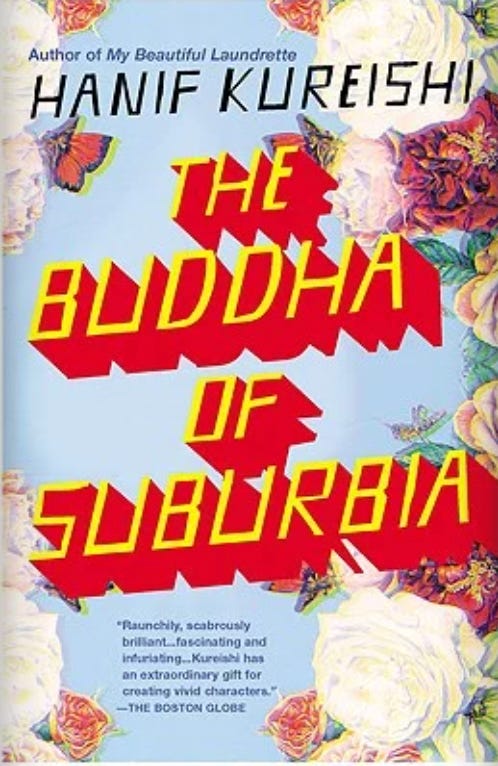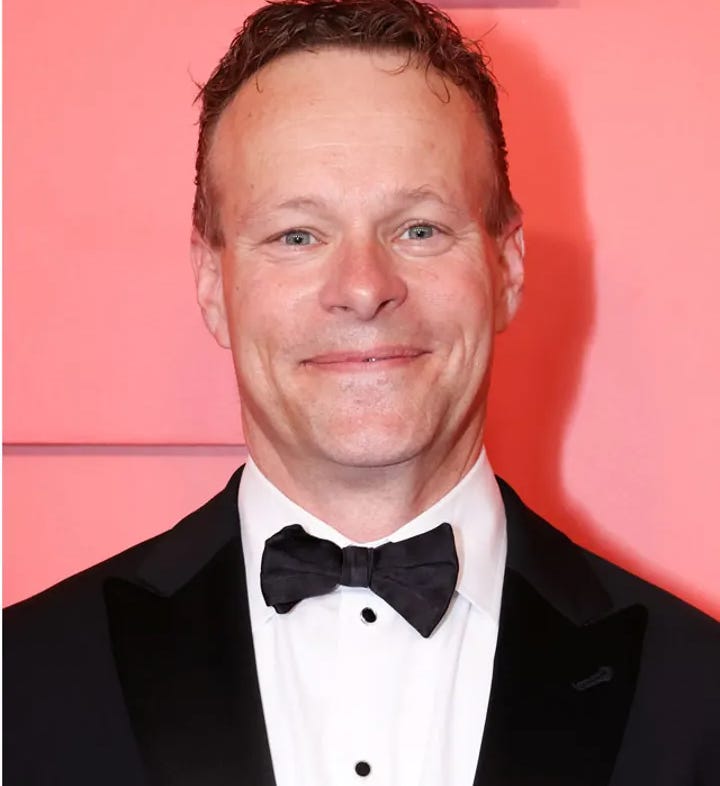Hello Smarty! It's Your Weekly Recs!
Hanif Kureishi, Maitreyi Ramakrishnan, McKinley Dixon, and the Licht-apocalypse...
Dear Wags,
The day after Christmas,
went for a stroll. It ended badly. “I should like you to know that on Boxing Day, in Rome, after taking a comfortable walk to the Piazza del Popolo, followed by a stroll through the Villa Borghese, and then back to the apartment, I had a fall,” he wrote soon after. “I had just seen Mo Salah score against Aston Villa, sipped half a beer, when I began to feel dizzy. I lent forward and put my head between my legs; I woke up a few minutes later in a pool of blood, my neck in a grotesquely twisted position, my wife on her knees beside me.”That spill got a lot of attention. Koureishi, 68, is a globally acclaimed novelist, playwright, and screenwriter with a vivid Substack presence. He survived his accident, but was left unable to move his arms and legs. Since then, he’s updated the world on his progress via his platforms (loved ones help with the typing).
Last month, he sounded off about something that concerns many writers, though few speak about it. Kureishi is concerned about creative inhibition and cowardice in publishing. He’s hardly a reactionary. Growing up in Kent, Kureishi experienced the casual racism of 1960s Britain. He gained notice as a playwright and won a 1985 Academy Award for the screenplay of My Beautiful Launderette, about a gay Pakistani-British youth. His debut novel, The Buddha of Suburbia, won the Whitbread Prize. Things went up from there.
Kureishi rose to fame being fearless. Not long ago, big novelists were routinely controversial; Not for Everybody must be somewhere in the job description of Writer. In any case, he’s one more critic of creeping censorship culture in creative industries. We assume he hates right wing book bans at least as much. But sometimes, it’s necessary to point out the trouble brewing in your own house.
Recently, a former student told Kureishi she had shown her manuscript to a sensitivity reader even before submitting it. She feared something she wrote might be construed as offensive. Anybody who's written a book can relate to this, because something can quickly turn into anything. Her anxiety is understandable, but Kureishi was alarmed. He believes literary excellence can’t be achieved from a defensive crouch.
I’ve had a novel parsed by a sensitivity reader. The experience was not unhelpful; I have no quarrel with that nice person. If you invent a character unlike yourself, it’s a good idea to get the details right. But even if you and your editors are diligent, you might still get something wrong in the eyes of a shadowy critic. If that offense concerns issues of identity, it’s going to be unpleasant. One way to avoid this is to never write about anything or anyone outside your immediate experience. This doesn’t typically make for scintillating fiction.
Sensitivity reads first took hold in the YA genre, as a byproduct of social media and its most activated users. The intentions behind these efforts are mostly well-intentioned, though corporate ass-covering plays its part. To publish anything is to expose oneself, and, not infrequently, to piss somebody else off. In a fractious, wired society, hyper-attuned to controversy, the sensible steer clear of trouble.
Kureishi is having none of it. He has lived his messy, extraordinary life in public, and stardom affords some protection. “It has to be part of the writer’s job to be offensive, to blaspheme, to outrage and even to insult,” he wrote. “I don’t want to live in an atmosphere of fear and inhibition where writers are afraid of expressing their true selves for fear of offending someone or other. It is the work of great writers to turn the world upside down, to present opinions which go against the prevailing trends. It is not our job to please but to challenge, to make us think differently about our bodies, our sexuality, politics and normativity.”
In our cozy living rooms, most thoughtful people would agree. But then we have to go to work. Nobody wants to be subject of a social media pile on. Nobody wants to be labeled culturally insensitive (or worse). Nobody wants to lose a book deal or a job over a sentence. Writers, like anybody, simply want employment.
But what do we lose when keep our heads down and avoid creative risk, when we skip difficult subjects to keep the peace, when we blunt humor and ingenuity in favor of safety? If art cannot transgress or provoke, it is something else. Wallpaper, maybe.
When people say such things, they are bidden to list all the ways they are not politically or otherwise dreadful. That’s an unfair burden. Advocates for creative freedom shouldn’t apologize too much. It’s perfectly consistent to decry the censorship impulse wherever it crops up. It’s probably most helpful to identify it in your tribe, not just condemn it in those you despise. Still it’s mostly been left to older, established and irascible writers—Koureishi, Salman Rushdie, Lionel Shriver—to speak uncomfortable truths in the publishing world. They came of age without the benefit of sensitivity reads, and their work, however imperfect, still dazzles.
The job shouldn’t be left to them. Publishers should be the grown ups in the room when controversies arise and defend writers who dare to offend. Not doing so costs us all something. There’s an element of committee work in creativity but great literature transcends it. It demands singular vision and no small amount of risk. Koureishi, a battered and inconvenient soul, has the courage to say so.
Yours Ever,
Thomas Stockmann
Know When You’re Licht!
Who knew a magazine profile (in the Atlantic!) could still pack such a wallop. Wag Tim Alberta’s devastating 15,000 word profile of Chris Licht, much discussed, snuffed his 13-month tenure as CEO of CNN. The PR team that helped build that bomb— which revealed how much he loves his trainer, Joe Maysonet (he seems great!)—are on their way out with other Lichtomaniacs. “I should not be in the news,” Licht told staffers in a now legendary editorial call. “And for that I’m sorry.” Then the hammer came down from Warner Bros. Discovery CEO David Zaslav: “Unfortunately, things did not work out the way we had hoped – and ultimately that's on me. I take responsibility.”
Oof, the unhappy marriage of news and business. Nasties are reveling in kicking Licht while he’s down. That Donald Trump town hall was an abomination, but CNN’s woes are bigger than the C-suite. Only 3.3. million people tuned in Trump insult the network to its face. With average prime time viewership hovering around a half million, execs tried to spin the fiasco as good news. It wasn’t, but it did cause CNN’s rank and file journalists to revolt.
Licht never won over the newsroom, which is full of Jeff Zucker partisans. Whatever! The business model is farkakte. CNN’s coverage is a dreary merry-go-round of talking heads and the core audience is in its sunset years. Like all cable news outfits, it prioritized cheap blah-blah-blah over expensive original reporting. For awhile that seemed to work. Now it’s just another institution hollowed out by ratings chasing. CNN can’t tack back to something that looks like journalistic credibility, because the remaining audience would never tolerate it. Nobody dares make the case for original reporting as a revenue driver. The big pharma advertisers that float the budgets have other ways of getting at consumers. None of this will shift easily, whoever is in charge.
It would be nice if CNN”s overlords saw it as more than a line item on a balance sheet, but an important pillar of U.S. journalism. They almost certainly won’t. “Poor Licht,” says a CNN Wag. “He was never going to succeed. Expect the pain cycle to continue.” — Diana Christensen
Humans vs. Robots, II
Ghost of Nikki Finke says toldja again: The 160,000 members of SAG-AFTRA overwhelmingly authorized a strike if negotiations stall with the Alliance of Motion Picture and Television Producers (AMPTP). If the parties can't come to an agreement in little more than three weeks, it’s walkout time.
When 98 percent of actors agree on anything, Hollywood is having an extraordinary moment. What unites actors is a perennial hunger for work, and what they are most anxious about is that in the future, generative AI and a parsimonious streaming ecosystem will discard them. They are right to be concerned.
Six weeks in, Hollywood’s writers are picketing for the same reasons. (The Directors Guild board unanimously approved a new contract with the AMPTP; these issues were at the fore). The last actors strike, in 1980, also hit at a transformative time, as the industry shifted to cable and home video. Now they are ready to go to the mat over video auditions, residuals, and tech that mimics human performance.
Beneath all this is frustration with a show business economy that’s coming apart. Like the writers, the actors are fed up with a model that pads the salaries of a few while they get squeezed. Rage fuel has activated them in an unprecedented way. It’s a rebellion against a new way of doing business that already feels stale—and the hucksters who hyped it. The actors are itching for a fight. And spirit is catching. — Reuben Warshowsky
Grad Night
Never Have I Ever (Netflix). Devi Vishwakumar (Delightful Maitreyi Ramakrishnan) is an oasis in a sea of teen misery. She has her problems, but she always finds a way through. The final season of Never takes us through her senior year at Sherman Oaks High School—misadventures narrated by Stroke of Genius John McEnroe. The kids are all right. — Andie Walsh
Keep reading with a 7-day free trial
Subscribe to CultureWag to keep reading this post and get 7 days of free access to the full post archives.





